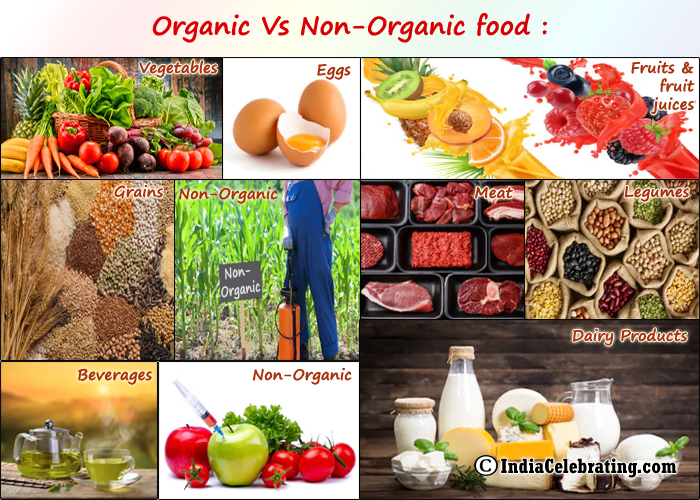Why You Should Eat Organic Food – Organic Vs Non-Organic food
Organic food has been a way of life for mankind since ages. In the course of time, the world population witnessed rapid increase and accordingly the demand for food also soared high, leading to rampant exploitation of soil and natural resources. As soil quality degraded, the world experienced long spells of famines and droughts, it gave rise to the need to develop and implement novel, environmentally sustainable methods to increase the yield manifold to meet the needs of people. All this promoted the cultivation of organic food.
Considerable interest in organic agriculture methods is growing due to the problem of increase in degraded lands where the present farming system has very low resources, essential for agricultural production. In addition to that, consumers also have a growing interest in organic agriculture.
There is growing awareness of the environmental costs of agriculture like the deteriorating quality of drinking water and soil as well as the impact of agriculture on landscape and wildlife.
Thus the resulting demand for organic products is creating the opportunity to sell organic products at premium prices.
What is Organic Food?
Organic food is produced according to certain production standards. These standards may vary worldwide. In simple words, we can state that the organic produce is grown without the use of pesticides or synthetic fertilizers. In general, organic farming features practices those involve the right use of natural resources and promotion of ecological balance as well as conservation of biodiversity.
Organic food products are either grown under a natural system of agriculture without the use of chemical fertilizers or they are processed from organically produced raw materials. Farming techniques used to grow organic foods are much cleaner and safer for the environment and for human health as well.
Nowadays organic foods are gaining popularity as people have become aware of their benefits. Organic foods do not contain any chemical pesticides and fertilizers and are grown naturally with the use of manure or compost and natural pesticides and insecticides.Organic fertilizers, as compared to those composed chemically for conventional crop growing practice, are derived from human and animal excreta, and manure of plants especially grown for the purpose of organic farming.
Any food offered for sale as ‘organic food’ in India needs to comply with the provisions laid down under the National Programme for Organic Production (NPOP) administered by the Agricultural and Processed Food Products Export Development Authority (APEDA).
Organically grown crops tend to use natural fertilizers like manure to improve plant growth. Besides this, organic farming tends to improve soil quality and the pave the way for the conservation of groundwater. It also reduces pollution and may be better for the environment.
Organic farming is a legally enforced method in several countries, introduced and regulated by the IFOAM or International Federation of Organic Agriculture Movements. This is an umbrella organization for organic farming methods introduced in 1972.
Various Categories of Organic Food (Examples/List of Organic Food)
A whole range of fruits and vegetables are available organically in the markets. Apart from the most commonly purchased organic foods such as fruits, vegetables, grains, dairy products and meat, there are many processed organic products available such as sodas, cookies and breakfast cereals. Organic milk and meat are richer in nutrients than their conventionally grown counterparts.
The demand for organic foods began with fruits and vegetables given the evidence of pesticide residues in them. However, the popularity of organic foods has now extended to food grains, pulses, tea, spices and even oil seeds.
Apples, peaches, strawberries, grapes, celery, spinach, cucumbers, cherry, tomatoes, peas, potatoes, and peppers are some of the fruits and vegetables that should be bought organic as these are most heavily sprayed by pesticides in normal, usual or regular farming methods.
In all, following foods are covered under the current organic standards:
1. Vegetables
Organic vegetables account for the majority consumption of organic food. Spinach, tomatoes, cauliflower, potato, bitter gourd, carrot, capsicum and green chilli constitute a significant part of the offered organic vegetable option. These vegetables mostly have the exposure of humans rather than toxic chemicals and fertilizers. They are hand weeded and densely planted.
2. Fruits and fruit juices
Organic fruits contribute a great deal towards the consumption of organic food products in India. Fruits like alphonso mangoes, pomegranates, bananas, peaches and apples are the most bought organic products. In such types of fruits, quick ripening chemicals like acetylene gas in the form of calcium carbide are not used and shots of ethylene hormone are also not given to the un-ripened fruits to fasten the ripening process. The quality of organic fruits with consistent sweetness can be felt up to the core of the fruit unlike chemically ripened fruits.
There is increasing preference for organic fruits juices these days. This includes coconut water, orange juice, apple juice, pineapple juice, aloe vera juice, gooseberry juice, amla juice etc.
3. Grains
Currently, organic food grains are in great demand as consumers are now becoming increasingly aware and health conscious. Products in this category include wheat, millet, corn, maize and rice. To grow these grains, mulches, organic fertilizers and cow dung compost are used in place of synthetic nitrogen fertilizers, herbicides and pesticides.
4. Legumes
Consumers are displaying marked preference for organic pulses including moong, chana, toor, masoor, urad, arhar, kidney beans etc. It has been observed that organically grown pulses are sweeter and enriched with high nutritional elements. In addition to that, the aroma of cooked organic pulses speaks for itself and its elite level.
5. Dairy Products
Milk constitutes a popular item in the list of organic food products. In a simple language organic milk means the milk obtained from cows that are not treated with growth hormones and antibiotics and are fed on 100% organic products and allowed to graze naturally. All this is undertaken to ensure that the produced milk is free from any undesirable chemicals because the cattle’s produce is affected by what they eat.
6. Eggs
Organic eggs are produced from organic chickens that are kept on a natural diet and grains devoid of any antibiotics, chemicals, egg shells or ground bones. These chickens are not caged.
7. Meat
Organic meat is obtained from animals raised without treating, feeding and exposing them to any radiation, herbicides, pesticides, sewage Sludge, additives, preservatives or genetically modified organisms. Animals produced through organic means have healthier environments than conventional farming where they are administered of antibiotics, growth hormones and disease preventive medications. They are fed with grass, grains, berries, seeds and green leafy plants. The organic meat thus produced is enriched with Omega-3 and certainly is a healthier option than non-organic meats.
8. Beverages
Organic tea is in great demand at present. The reason for this is more flavoured leaves and higher nutritional values of organic tea. Organic tea cultivation is based on the conventional methods of farming to produce high-quality green leaves. In this method, hand weeding is done to avoid herbicides and the weeded out plant material is mixed with cow dung and used as fertilizer. Cow urine is used to protect plants from various kinds of insects. Other popular organic beverages include coffee, jal jeera, aam panna, nimbu pani, sugarcane juice, toddy and kokum juice.
Why to go for Organic Foods (Health Benefits of Eating Organic Food)
Organic foods and products are linked with various health benefits. The importance of organic food is now being increasingly felt by the population. According to a survey done by the Associated Chambers of Commerce and Industry of India (ASSOCHAM), around 62% households in upper-end segment prefer organic food now. Though presently these foods are costly but the increase in their demand and supply will bring their prices down gradually.
- Organic foods generally contain higher levels of antioxidants and certain micronutrients such as vitamin C, zinc and iron. Antioxidants are important nutrients found in fresh fruits and vegetables.
- Organic produce have reduced pesticide exposure as compared to their commercial counterparts, which is the reason why consumers desire to go for it. Certified organic produce is free from pesticide residues.
- 3. Organic foods are developed with a reduced antibiotic exposure. Animals raised organically are not given antibiotic additives; accordingly, organic dairy and meats products do not contain any residues of antibiotics.
- During recent years, there has been an increase in the production of genetically modified foods. However, lack of proper labelling of these foods has raised concern among people, prompting them to choose organic foods.
Based on these points, it is apparent that choosing organic food is good as it is free from elements which are harmful for human health. Organic foods are considerably more nutritive and safer for consumption; compared to locally grown fruits and vegetables. In the absence of pesticides and chemically laced fertilizers organic foods secrete vitamins and anti-oxidants, which are rendered biologically resistant to insects, germs and weeds.
Methods of Organic Food Production
Organic food is food produced by organic farming methods. These methods use organic fertilizers composed of manure; green manure (that is specially grown plants for this purpose) and bone meal (especially ground grains of waste animal bones and products).
Organic food is also produced by crop rotation (which is done by rotating different crops at the same time, during different seasons, on the same patch of land so that all the ingredients of the soil are utilized maximally). This method helps curtail soil erosion and encourages fertility and organic yield.
Another viable organic farming feature is companion planting, (used in gardening and agriculture, especially in industrialized and developing countries). It requires crops planted in proximity for various reasons – saving space, pollination, and poly-culture as against monoculture. In short it means planting more than one species of crops, such as alley cropping. This cropping style was popular in English cottage gardens and Asian forests; while thousands of years back in Mesoamerica (a historical region and cultural area in North America).
Organic farming augments biological pest control that is a method of controlling pests like insects, mites, weeds and plant diseases through antagonists. Antagonists rely on predation, parasitism and herbivorous. These are natural mechanisms of introducing farm pests to predate over and devour crop pests.
Tips to Buy Organic Food
Many food brands are actively promoting the organic food trend in India. Keeping in mind the popularity of these products, many e-commerce websites are making the best use of this situation and offer great deals to consumers. You can buy these organic food products at online markets, official sites of organic food brands, local market or supermarket.
You can buy organic foods even in mainstream grocery stores which are shelved with organic products. You can also buy organic cereals, sauces and even snack foods, such as chips. As their popularity increases, consumers are becoming increasingly aware of the advantages of organic foods.
You can make better choices about shopping organic to make eating organic more affordable. However, there are specific requirements that must be met in order to be able to label a product as organic. Hence it is important to check the products you are buying are truly organic. Always look for a certified organic seal on the product and then go for it to enjoy a healthy lifestyle, eat safe; live long and secure, naturally!
Organic vs. Non-Organic Foods
Organic foods are considered better in comparison to commercially grown foods. These foods are much healthier than conventional ones for several reasons. Being produced and processed naturally, organic foods are free from harmful chemicals. Consequently, such foods are good for human health and environmental friendly too.
Organic foods contain natural nutrients and minerals that our bodies need for growth, disease resistance and energy production whereas conventional foods contain artificial chemical nutrients which can prove to be harmful to one’s health when consumed over a long period of time.
Various studies have been performed to compare the content of nutrients in a range of crops under conventional and organic management practices. Conventional and organic crops differ in the content of specific nutrients. It is established that organic fruits and vegetables are full of healthy stuff whereas conventional food is almost devoid of it. Organic dairy products and meat have a higher content of omega-3 fatty acids compared to conventional products.
However, studies undertaken to compare the nutrient content of organic and non-organic foods have provided mixed results. According to these observations, nutrient composition does not differ greatly between organic and conventional crops. When compared, conventionally and organically produced foods offer similar nutrients, i.e. minerals, vitamin C and E; other than proteins that are higher in the former food types.
Organic growth takes longer to mature. The quantum of its produce is also low and insufficient. Organic foods are costly too. They succumb to market monopoly or the demand and supply ratio of big and minor markets. So, they fall short of supply in the competition ridden agricultural practices world over, a perennial topic of concern for agitating food and farm activists. Over and above, organic foods are not supported by government subsidies; they lose in the profit-making race; unlike regular crop growth.
However, organic foods have the edge over inorganic counterparts in various ways. They have a better taste and are chemical free. They are ecosystem saviour and go a long way in reducing water and soil pollution. They preserve agricultural diversity thus keeping the future of our children safe.
In addition to that, organic foods are vital in protecting our bodies against illnesses and body mechanism abnormalities whereas non-organic ones cause eating disorders, obesity and other associated illnesses.
Natural nutrients found in organic foods are vital for metabolic functions. On the other hand, conventional foods have artificial chemical nutrients and when consumed by us are not fully broken down leading to side-effects in the long-term.
Let us have a Glance on the Positive Aspects of Organic Food
- In organic food, the use of pesticides is nil. It is procured almost farm fresh as it grows on economically viable, smaller sized farmlands.
- Organic farming is healthy for environment it assures our safety through water conservation, it is non-pollutant, reduces soil erosion, upgrades farm fertility, uses less energy and water, and its farming methods make economical use of farm space.
- Replacing regular fruit, vegetables and cereals with organic versions provide extra antioxidants in the diet.
- Organic produce carries significantly fewer pesticide residues than conventional produce.
- Organic foods are not produced by using any chemical pesticides.
- Organically grown crops have fewer nitrates and more of certain vitamins, minerals and antioxidants.
- Organic dairy products and meat have more omega-3 fatty acids.
- Organic food consumption may reduce the risk of allergic disease, overweight and obesity as consumers of organic food tend to have overall healthier lifestyles.
- Organic food helps to minimize the adverse effects of certain pesticides on children’s cognitive development observed at current levels of exposure.
- It is non-genetically altered (GE) food, which does not contain artificially tampered unnatural DNA that is used to modify food for bulk consumption and longer life span to reach big cities and metropolises.
Conclusion
Organic food is universally accepted as safest for consumption due to its eco-friendly farming methods and nutritive values, which makes it more edible and nature fresh. The advantages of organic farming are sustainability i.e. crops diversity, longevity; self-sufficient growth, autonomy, health, food safety and security.
Our mental, physical, psychological, emotional well-being depends on how food we eat is grown – organically or conventionally. The eco-friendly farming practices affect plants, animals and humans equally, positively and climactically. Organic food production has several potential benefits for human health.
Making an active commitment to choose healthy alternatives and nutrition is a great way to commit to a healthier life. Organic food is a better option for human health and environment as it reduces pollution in the air, water, and soil. It also helps us conserve water, reduce soil erosion, and minimize energy consumption.







